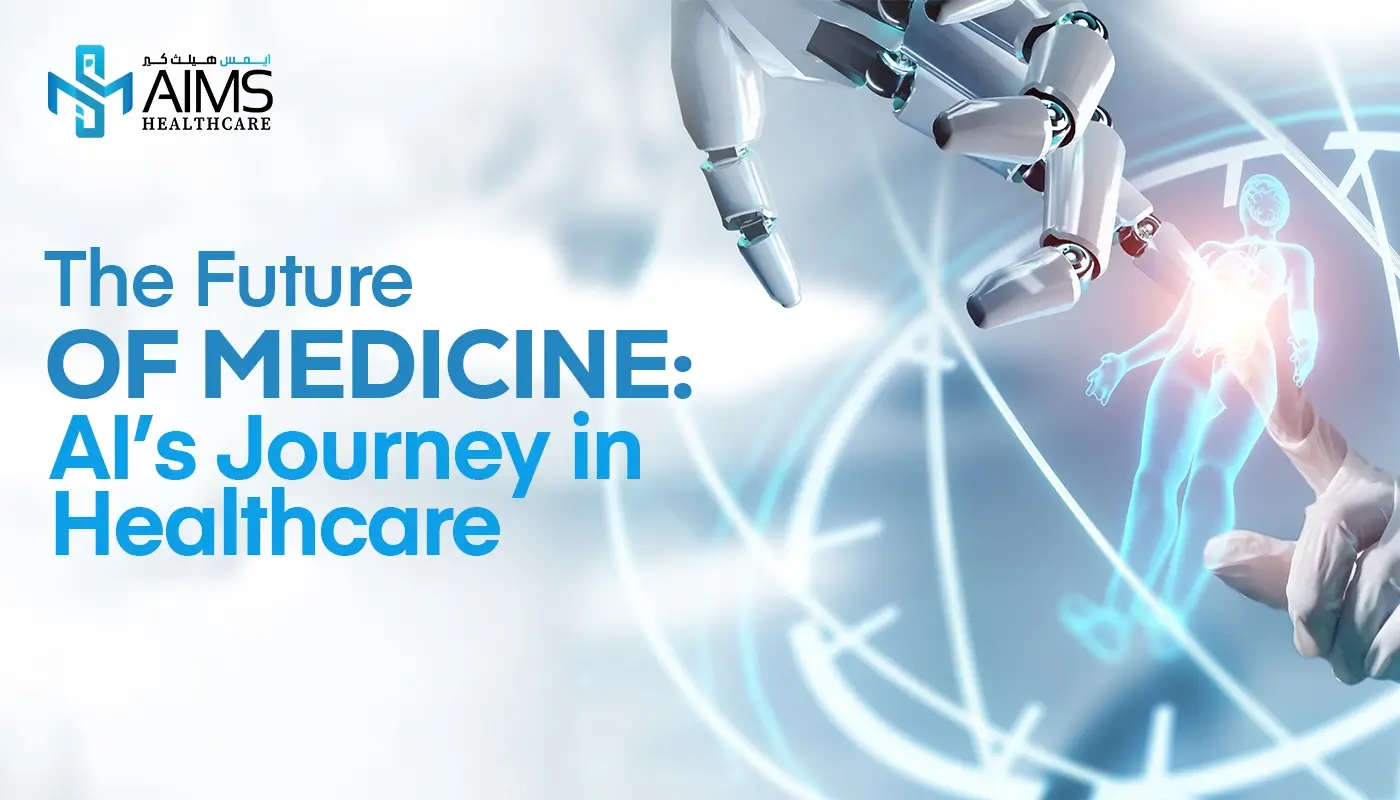
Benefits of NIPT Test for Expecting Mothers
Table of Contents Healthy Fasting, Happy Digestion! Explore Tips for a Smooth Ramadan. As the holy month approaches, fasting holds significant spiritual and cultural importance

Imagine a world where you can get a diagnosis from a chatbot, receive personalized treatment recommendations from a virtual assistant, and access the latest medical research from a smart database.
This is not science fiction but the reality of artificial intelligence (AI) in healthcare.
AI is the ability of machines to perform tasks that normally require human intelligence, such as learning, reasoning, and decision-making.
AI has been advancing rapidly in various fields, and healthcare is no exception. AI can help improve healthcare in many ways, such as diagnosis, treatment, research, and administration. However, AI also poses ethical, technical, and regulatory challenges that must be addressed.
In this blog, we will explore how AI is transforming healthcare, the benefits and risks of AI in healthcare, and the future trends and opportunities of AI in healthcare. We will also share some examples of how AI is used in healthcare today and how you can get involved in this exciting field.
Whether you are a patient, a provider, or a researcher, AI can offer new possibilities and solutions for better health and well-being. Join us as we embark on this journey of discovering the future of medicine with AI.
AI can be classified into different types based on complexity and functionality. Some of the common types of AI in healthcare are:
| Machine learning: The process of teaching machines to learn from data and make predictions or decisions without explicit programming. | Deep learning: A subset of machine learning that uses multiple layers of artificial neural networks to learn from large amounts of data and perform complex tasks. |
| Natural language processing (NLP): The ability of machines to understand and generate natural language, such as speech or text. | Robotic process automation (RPA): The use of software robots to automate repetitive and rule-based tasks. |
Some examples of medical technology advancement are:
AI can help analyze medical images, such as X-rays, CT scans, MRI scans, and ultrasound images, and detect abnormalities, diseases, or injuries. For example, Google’s DeepMind developed an AI system that can accurately diagnose eye diseases from retinal scans.
AI can help clinicians make better decisions by providing relevant information, suggestions, or recommendations based on data and evidence. IBM’s Watson can help oncologists diagnose and treat cancer patients by analyzing their medical records and providing personalized treatment options based on the latest research.
AI can help automate billing by extracting information from medical records, verifying insurance coverage, generating invoices, and processing payments. One such AI platforms that can handle various billing tasks for healthcare providers is Olive. It can handle claim submission, denial management, and payment posting.
AI can help monitor and track the spread of diseases by collecting and analyzing data from various sources, such as social media, news articles, online forums, and health records. For example, BlueDot is an AI company that can detect and predict infectious disease outbreaks using natural language processing and machine learning.
AI has the potential to transform healthcare in many ways in the future. Some of the factors driving AI adoption in healthcare are:
AI can help provide customized care for each patient based on their individual needs, preferences, and characteristics. For example,
AI can play a crucial role in connecting patients with doctor on call anytime and anywhere through voice or video calls. Telemedicine and telehealth services can use AI to enable remote consultations, allowing patients to receive medical advice and diagnoses from the comfort of their homes.
AI can streamline collecting samples and performing lab tests at home using smart devices or test kits. Patients can use AI-powered apps or devices to collect samples. AI algorithms can assist in analyzing the results, providing rapid diagnostics and reducing the need for in-person laboratory visits.
For individuals needing physiotherapy, AI-powered applications can guide them through personalized exercise routines, monitor their progress, and provide real-time feedback. This allows patients to receive physiotherapy services in the comfort of their homes, with AI adapting the exercises based on their specific needs.
AI can assist skilled nursing care at home by providing caregivers real-time patient monitoring and support. Smart devices and wearables can collect health data, and AI can analyze this information to detect changes in the patient’s condition, alerting caregivers and virtual health assistants when necessary.
AI-driven home monitoring systems can enhance elderly care at home by monitoring daily activities, detecting falls or emergencies, and providing assistance when needed. These systems can help seniors maintain independence while ensuring their safety and well-being.
AI can offer valuable support for mothers and infants at home by providing guidance on prenatal care, infant care, and breastfeeding. AI-powered apps and devices can offer personalized advice and monitor the health and development of both mother and child.
AI can help optimize treatment plans for individuals requiring vitamin infusion therapy by considering individual health data, nutritional needs, and treatment schedules. AI can also assist in safely administratering therapies at home, ensuring proper dosage and monitoring for adverse reactions.

AI can help leverage the vast amount of data generated by healthcare systems, such as electronic health records (EHRs), wearable devices, sensors, or genomic data. For example, AI can help integrate and analyze data from different sources and provide insights for improving quality, efficiency, or care outcomes.
AI can help facilitate collaboration among different stakeholders in healthcare, such as patients, providers, researchers, or policymakers. For example, AI can help create platforms or networks for sharing data, knowledge, or resources across different domains or locations.
Despite the benefits and opportunities of AI in healthcare, many obstacles hinder its adoption. Some of the challenges and barriers to implementing AI in healthcare are:
AI relies on data to learn and perform, but the data in healthcare is often incomplete, inconsistent, or inaccurate. For example,
AI needs to access and integrate data from different sources and systems, but the data in healthcare is often fragmented, isolated, or incompatible. For example,
AI needs to protect and preserve data from unauthorized access or misuse, but the data in healthcare is often sensitive, confidential, or personal. For example,
Standardizing and harmonizing data to improve its quality and consistency. For example,
Combining and consolidating data to improve its availability and accessibility. For example,
Securing and safeguarding data to improve its privacy and protection. For example,
AI in healthcare is a rapidly developing field that has the potential to improve the quality, accessibility, and efficiency of health services. However, AI also poses ethical and social challenges that must be addressed. Some of these issues are:
AI is a powerful and promising technology that can revolutionize healthcare in many ways. AI can help improve diagnosis, treatment, research, and administration, and enhance patient experience and satisfaction. However, AI also comes with ethical, technical, and regulatory challenges that must be carefully considered and addressed.
AI is not a replacement for human doctors but a tool that can augment and assist them. This is true even for home health care Dubai, where AI can help healthcare providers with virtual assistants and chatbots. Aims Healthcare is one of the leading home healthcare services providers in Dubai, offering doctor on-call, physiotherapy on call, wellness at home, and more. These services can benefit from AI by becoming faster, more accurate, and more personalized.
To learn more about AI in healthcare or home healthcare services in Dubai, you can visit the website of Aims Healthcare. You can also contact them directly to book an appointment or request a quote. Thank you for reading this blog, and we hope you found it useful.

AI can enhance patient outcomes by enabling early disease detection, personalized treatment plans, and predictive analytics. It assists healthcare providers in making more accurate diagnoses and treatment decisions.
AI is used in drug discovery by analyzing massive datasets to identify potential drug candidates and predict their effectiveness. This accelerates the drug development process, making it faster and more cost-effective.
AI is not replacing healthcare professionals but rather augmenting their capabilities. AI assists doctors, nurses, and other healthcare professionals in making more informed decisions, improving patient care, and streamlining administrative tasks.
Privacy concerns in AI healthcare relate to the collection and handling of patient data. To address these concerns, healthcare organizations must implement robust data security measures, comply with regulations, and ensure patient consent for data usage.
Integrating AI into existing healthcare systems requires careful planning and investment in both technology and staff training. Healthcare organizations should collaborate with AI experts and vendors to ensure a smooth integration process.
Yes, there are regulatory guidelines for AI in healthcare. In the United States, for example, the FDA provides guidance on the development and use of AI-based medical devices. Other countries have similar regulatory bodies and guidelines.

Table of Contents Healthy Fasting, Happy Digestion! Explore Tips for a Smooth Ramadan. As the holy month approaches, fasting holds significant spiritual and cultural importance

Table of Contents Healthy Fasting, Happy Digestion! Explore Tips for a Smooth Ramadan. As the holy month approaches, fasting holds significant spiritual and cultural importance

Table of Contents Healthy Fasting, Happy Digestion! Explore Tips for a Smooth Ramadan. As the holy month approaches, fasting holds significant spiritual and cultural importance